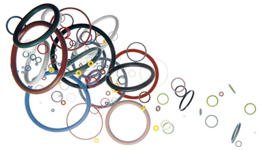FEP ENCAPSULATED O-RINGS Silicon Core with FEP Jacket.
Description: Whilst technically inferior to Viton as a seal Material, Silicone does have
the ability to work at lower temperatures than Viton. FEP Encapsulated "O" Rings are
solvent resistant and chemically inert (except for attack by alkaline metals, fluorine and
some halogenated compounds at high temperatures) yet have an elastomeric memory
near that of rubber "O" Rings. FEP polymer, also, has an extremely low coefficient of
friction (0.1 to 0.2) and very low permeability to gases, making Chem-Rings a virtually
universal seal for use in hostile environments.
Limitations: Dynamic use where high speeds and poor finishes are encountered.
Where the housing design requires excessive stretch or collapse of the O-ring during
installation.
Chemistry: FEP (fluorinated ethylene propylene) is a copolymer of hexafluoropropylene
and tetrafluoroethylene. It differs from the PTFE (polytetrafluoroethylene) resins in that it
is melt-processible using conventional injection molding and screw extrusion techniques.
Fluorinated ethylene propylene was invented by DuPont and is sold under the
brand name Teflon.
Temperature Range:
-60° to 204°Celcius

